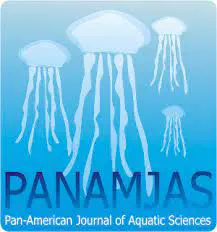Effects of recreational activities on the fish assemblage structure in a northeastern Brazilian reef

Abstract
Uncontrolled recreational activities are known to cause severe damage to reef dwelling organisms and to the reef overall structure. In order to investigate the effects of human recreational activities on the reef fish assemblage, surveys were undertaken in two shallow coastal reefs (Picãozinho and Quebra Quilhas) with similar physiographic features. However, recreational activities only take place at the former, and the latter was investigated as a control reef. The most speciose and abundant families on both reefs were Pomacentridae, Scaridae, Haemulidae, Acanthuridae and Labridae, but species evenness was fairly different between the reefs due in particular to the extremely high abundance of the sergeant major Abudefduf saxatilis at Picãozinho. This species represented almost ⅔ of all individuals recorded at Picãozinho and was the underlying feature responsible for the assemblage structure pattern observed on this reef. The present study showed that one single species was of major influence on species evenness and trophic structure, and that unregulated recreational activities have the potential to severely alter reef fish assemblage structure.